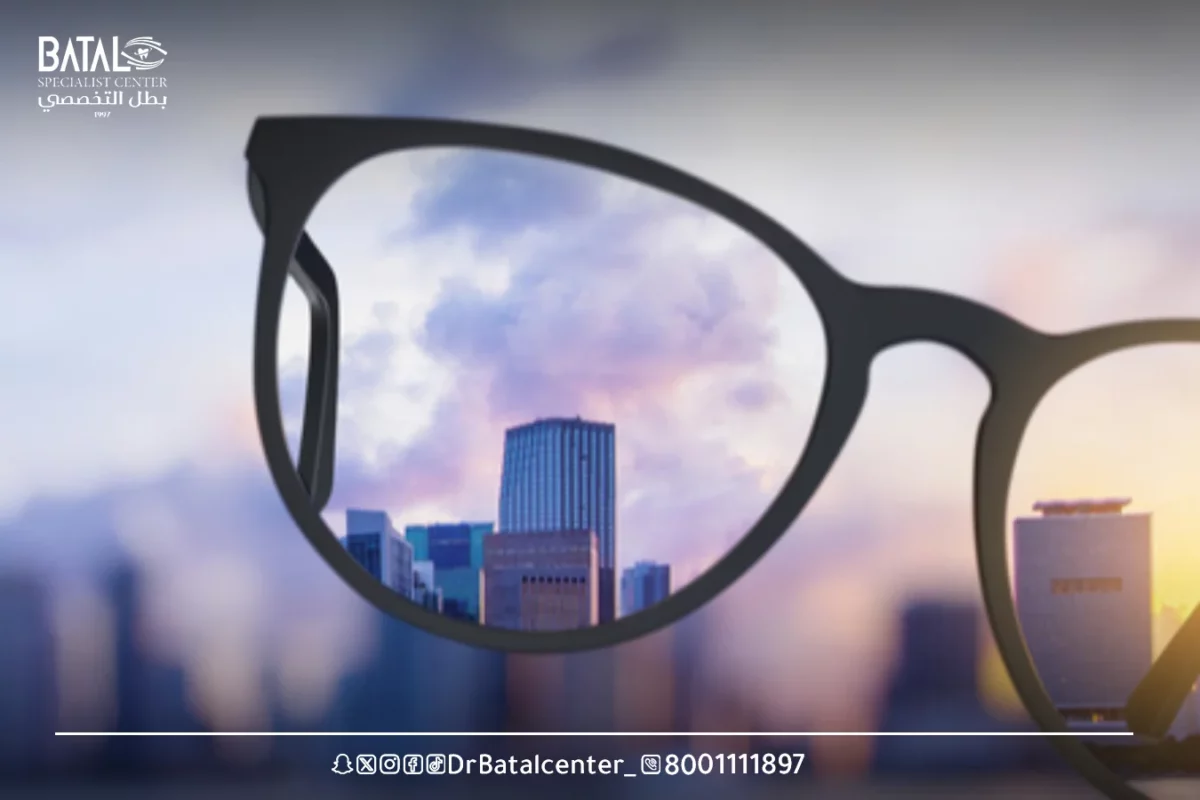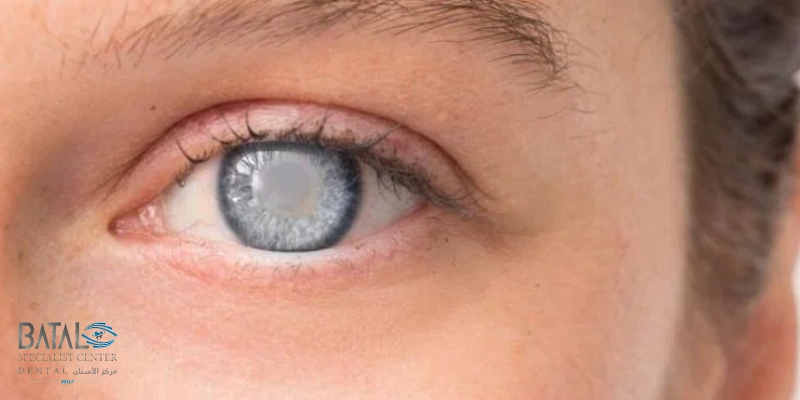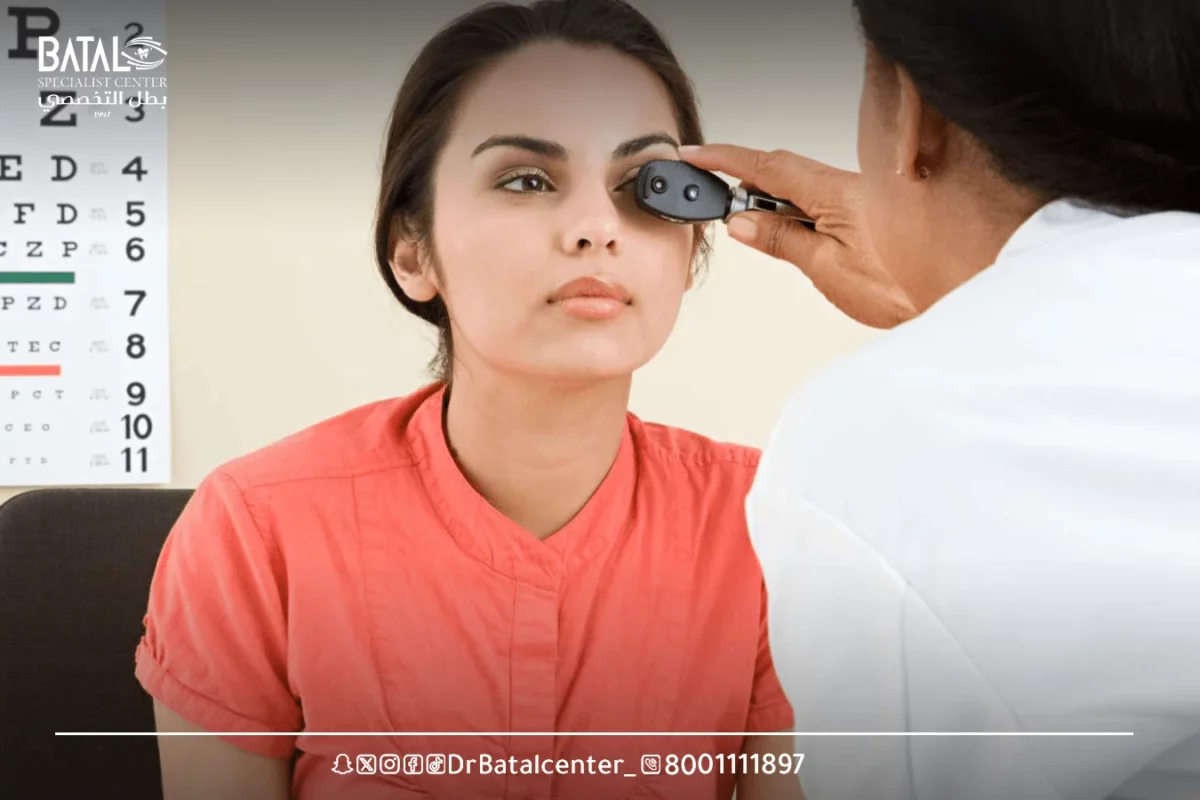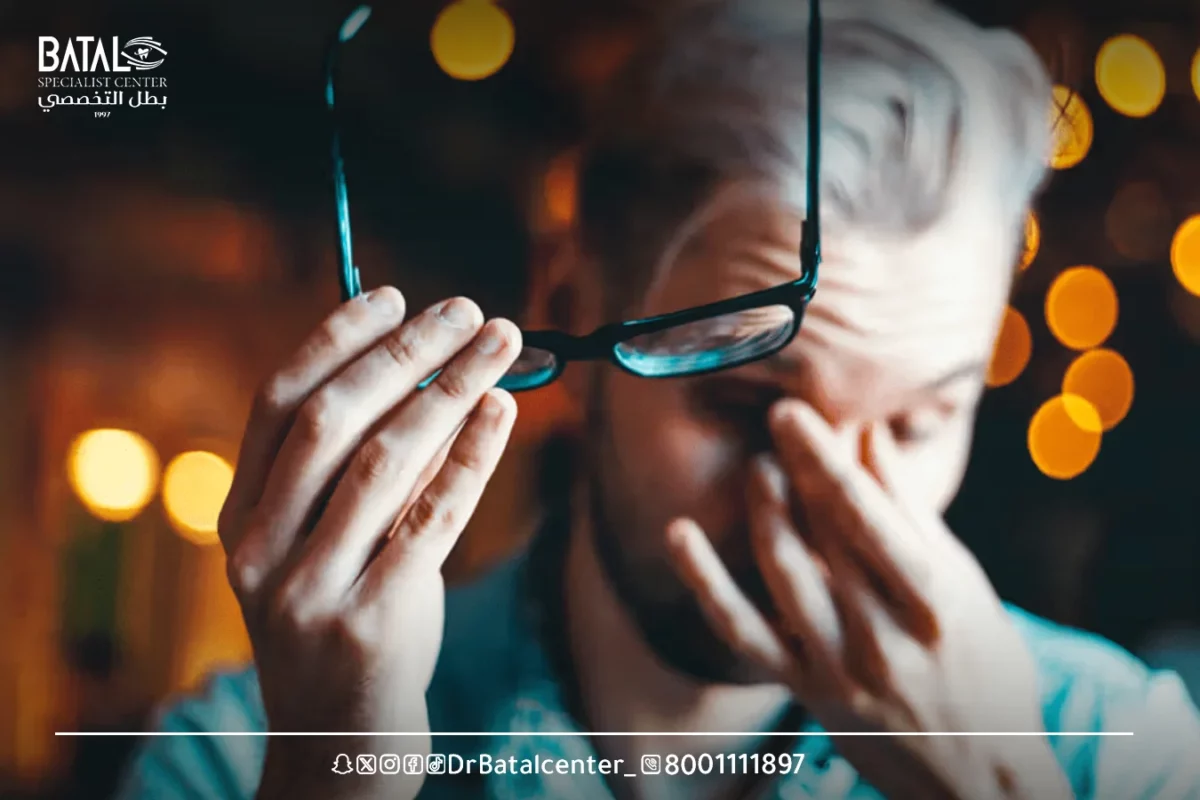Med info
Eye clouding (blurred vision): causes and treatment at Batal Specialized Complex

Blindness, blurred vision, or blurred vision refers to blurred vision, where the eye is unable to focus properly, resulting in blurred and blurry vision.
If you’ve recently noticed blurry vision in one or both of your eyes, you may find yourself wondering what causes sudden blurry vision and whether it could be a sign of something serious.
Blindness can have many causes, from refractive errors such as myopia or farsightedness to more serious conditions such as cataracts or even strokes. In some cases, sudden dull vision can be a sign of eye injury or infection. Eye trauma such as a blow to the head or face can lead to blurred vision, and scratching the cornea can also lead to blurry vision.
There are countless causes of blurry vision, and here we’ll discover some of the most common ones, offer tips on how to get rid of blurred vision, and discuss when you should seek medical help.
What is eye blur (blurred vision)?
Blind eye is an eye condition in which vision is blurry or reduced. Blurred vision occurs when you have difficulty seeing fine details of something you are looking at, regardless of distance. Your eyes cannot process light signals sharply, making it difficult for you to focus and see things clearly. Instead, objects appear blurry and indistinct.
.If you suffer from blurred vision, you should come to Batal Specialized Complex in Jeddah for an eye examination. Your ophthalmologist can take a look at your eyes to find the cause of your blurred vision and recommend some treatment.
Eye clouding in English
. Blurred Vision The medical name for blurred or blurred vision is

Common causes of eye blur
There are many reasons for blurred vision. It could be as simple as needing new glasses or it could be a sign of a serious condition.
It is important to seek medical attention as soon as possible if you experience sudden changes in your vision. Your doctor can also determine the cause of your blurred vision and provide treatment options that will help restore your vision.

Some of the most common causes of blurred vision include:
Corneal problems and tears
- Dry eyes
Dry eye, also known as dry eye syndrome, is an eye condition in which there is a problem with tear production in the eye or the tears in the eye lack vital materials to function properly, resulting in the eye not receiving enough lubricant or moisture. Which causes a brave and painful feeling in the eye, and dry eye disease also causes blurred vision because problems with tears and tear production interfere with the cornea’s ability to focus light on the crystalline lens, leading to poor and blurred vision.
- Scratches or ulcers
Eye injuries refer to damage caused directly to the eye by sharp force or other forms of physical trauma such as scratches or ulcers. Eye injuries can damage parts of the eye and reduce the eye’s ability to function as a whole. Eye injuries also cause blurred vision or blurred vision through potential eye damage such as corneal damage or lens damage, which results in decreased ability to focus.
Bacterial or viral infection
Medical conditions that can cause clouding of the eye include endophthalmitis, conjunctivitis, and keratitis, as follows:
- Endophthalmitis: Endophthalmitis is a medical condition that causes inflammation of the eye due to the possibility of eye fluids becoming infected, affecting concentration, causing blurred vision, and may lead to secretions coming out of the eye.
- Conjunctivitis: Conjunctivitis is a medical condition in which the conjunctiva or eyelid becomes inflamed and causes the eye to turn red and blood. Conjunctivitis can cause clouding of the eye due to infection or inflammation that interferes with general vision and parts of the eye’s ability to function properly, leading to poor concentration.
- Keratitis: Keratitis is a medical condition in which the cornea of the eye becomes inflamed due to infection. Keratitis causes blurred vision because it affects the cornea’s overall ability to focus the light it receives, leading to poor vision skills, poor concentration, and blurry vision.
Lens problems
- Cataracts
Cataracts, or cataracts, are an eye condition in which the crystalline lens of the eye begins to become cloudy rather than clear. Cataracts are usually an age-related eye condition. Cataracts cause blurred vision by interfering with the lens’s ability to focus and receive light. A cloudy lens causes cloudy and blurry vision that may also reduce a person’s ability to perceive color.
Retinal problems
- Network separation
Retinal detachment occurs when the retina, the layer of tissue at the back of the eye, pulls away from its normal position. This can cause blurred or distorted vision, and vision loss.
Read more about: The cost of retinal detachment surgery in Saudi Arabia
- Macular degeneration
Age-related macular degeneration, also known as AMD, is an eye condition in which, due to aging, the macula is damaged and weakened, resulting in poor frontal and central vision and focus. As the macula deteriorates, the eye’s ability to see straight ahead becomes unfocused and blurry, causing clouding of the eye.
Other eye diseases
- Glaucoma:
Glaucoma is an eye condition in which the optic nerve is damaged, often due to high fluid pressure in the eye leading to nerve damage. Glaucoma causes blurred vision by damaging the eye’s overall ability to see or deliver images to the brain.

Iriditis
Uveitis refers to the middle layer of the eye, where it can cause redness, pain, and vision problems.
Optic neuritis
Optic neuritis refers to swelling of the nerves and is a condition that affects people with multiple sclerosis, which can cause vision loss or blurred vision.
General medical conditions
- Diabetes
Diabetic retinopathy is an eye condition in which the retina and other blood vessels in the eye are damaged by diabetes and high blood sugar levels. Diabetic retinopathy causes blurry vision because the condition causes direct damage to the retina and causes constant bleeding in the eye due to the replacement of new blood vessels with damaged ones.
- High blood pressure
High blood pressure can cause a condition called hypertensive retinopathy which can cause damage to the small vessels at the back of your eyes. This can lead to decreased vision or even blindness if left untreated.
- Autoimmune diseases
If blurry, dry eyes are accompanied by inflammation inside or around the eye, you may have uveitis. Inflammation usually occurs when your body fights an infection or when you have an autoimmune disease.
- eye strain
Eye strain is a medical condition in which the eye feels pain and fatigue as a result of staring or focusing on one object or focal point for a long time. Fatigue can lead to loss of focusing power in the eye, resulting in blurred vision.
- Getting older
Aging is caused by presbyopia, a condition of the eye in which the lens of the eye becomes stiffer and less flexible, making it unable to rotate or receive light effectively. Presbyopia causes blurred vision through the inability of a stiff lens to focus as strongly and clearly as before, making vision more difficult in low light, possibly causing headaches and making vision blurry and unfocused.

Symptoms of eye blur and when to see a doctor
Signs and symptoms of blurred vision or blurred eyes include:
- Difficulty concentrating is a symptom of blurred vision caused by eye problems such as refractive errors or lens problems.
- Double vision is a symptom of clouding of the eye caused by cataracts, or cloudy lenses, which cause blurring of general vision.
- Halos around lights are a symptom of blurred vision caused by cataracts or possibly glaucoma, if the aura is accompanied by a painful headache.
- Eye strain or fatigue is a symptom of blurred vision resulting from prolonged periods of intense focus on a single object or element in order to overcome blurred vision.
- Headache is a symptom of blurred vision caused by focusing for too long and staring at one thing and is associated with eye strain.
- Photosensitivity, also known as photophobia, is a symptom of blurred vision caused by migraines or dry eyes, which makes it difficult to focus on bright light due to lack of eye lubrication.
- Difficulty seeing at night: Difficulty seeing at night is a symptom of blurred vision resulting from eye strain and constant concentration for a long period of time.
How to diagnose eye blur at Batal Eye Specialist Complex
When a person suffers from blurred vision, it is important to undergo a comprehensive diagnostic process to determine the underlying cause. Diagnosing cataracts usually involves several main steps, including a comprehensive eye examination by an ophthalmologist, corneal examination, lens examination, retinal examination, and eye pressure tests.
- Comprehensive eye examination by an ophthalmologist at Batal Eye Complex
A comprehensive eye examination by an ophthalmologist at a Batal eye complex is usually the first step in diagnosing eye clouding. This examination is performed by an ophthalmologist who specializes in eye care. It includes a detailed assessment of the eyes and their structure to evaluate overall eye health and identify any abnormalities or conditions that may cause blurred vision. The ophthalmologist will review the patient’s medical history, perform visual acuity tests, and examine the eyes using various techniques and tools.

- Corneal examination
The cornea, the transparent outer layer of the eye, plays a crucial role in focusing light on the retina. A fundus examination helps determine if any abnormalities or conditions affecting the cornea are causing blurred vision. An ophthalmologist may use a slit lamp biomicroscope to examine the cornea and check for problems such as corneal abrasions, infections, or irregular shapes (such as astigmatism).
- Eye lens examination
The lens of the eye helps focus light onto the retina. Lens inspection aims to identify any conditions that may affect its clarity and function. Your eye doctor will evaluate the lens for any abnormalities, such as cataracts, which can cause blurry vision by obstructing the passage of light through the lens.
- Retinal examination
The retina is the light-sensitive tissue at the back of the eye that receives and processes visual information. Retinal examination is crucial in evaluating retinal health and identifying any problems that may be causing eye clouding. The ophthalmologist may dilate the patient’s pupil to get a better view of the retina and use specialized tools, such as ophthalmoscopes or fundus cameras, to examine its structure. This test helps detect conditions such as macular degeneration, diabetic retinopathy, retinal detachment, or other abnormalities that affect the retina.
- Eye pressure tests
Intraocular pressure tests, also known as tonometry, are performed to measure intraocular pressure (IOP). High eye pressure can be a sign of glaucoma, a condition that damages the optic nerve and can cause blurred vision. An ophthalmologist may use different techniques, such as a non-contact tonometer or Goldman tonometer, to accurately measure intraocular pressure.
- Eye coating treatment
There are several ways to treat blurred vision, but the most appropriate method for you depends on the cause as well as its severity. The most important treatments are:
- Glasses or contact lenses
Glasses refer to prescription lenses and frames that have a level of focus inside the lenses that helps correct focal and refractive errors that are in a person’s eye. Glasses are used to treat blurred vision by correcting possible root causes of vision problems, such as allowing a myopic person to focus at greater distances, which reduces the blurring of their vision.

- eye drops
Eye drops are medicinal substances containing chemicals such as saline or carmellose sodium that can be applied directly to a person’s eye in order to correct or relieve conditions such as dry eyes or eye allergies. Eye drops are used to treat dull eyes by providing lubrication to the eye that you may not get naturally due to another eye condition.
- Surgical treatment
Eye surgery refers to any type of surgery performed on the eyes, such as laser eye surgery. Laser eye surgery refers to a surgical procedure in which an ultraviolet laser is used to remove unwanted and excess tissue from the cornea and restore full corneal function, according to the Vision Eye Institute, an Australian ophthalmology services and research database. Laser eye surgery is used to treat blurry vision by directly treating one of the root causes of blurry vision and correcting cataracts or other eye conditions that may cause blurry vision in a person’s eyes.
- Lifestyle change
Lifestyle changes can play an important role in improving overall eye health and preventing or managing factors that contribute to eye blurring. While these changes may not directly treat blurred vision caused by certain medical conditions, they can support eye health and reduce the risk of visual disturbances.
Our doctors’ tips for preventing blurred vision and maintaining healthy eyes
Our doctors at Batal Specialized Complex in Jeddah provide a set of tips to prevent eye blurring, as follows:
- Maintain a healthy diet: Proper nutrition is essential to maintaining good eye health. Include foods rich in antioxidants, vitamins (especially A, C, and E), minerals, and omega-3 fatty acids in your diet.
- Managing chronic health conditions: If you have chronic health conditions such as diabetes or high blood pressure, it is important to manage them effectively.
- Take regular breaks from digital screens: Prolonged exposure to digital screens can strain your eyes and contribute to blurred vision.
- Protect your eyes: Protect your eyes from harmful UV rays by wearing sunglasses that provide 100% UV protection when you are outside.
- Practice good hygiene: Proper hygiene can help prevent eye infections that can cause blurred vision. Wash your hands well before touching your eyes or applying contact lenses.
- Avoid smoking: Smoking is associated with an increased risk of various eye diseases, including cataracts and macular degeneration.
- Maintain a healthy lifestyle: Do regular physical activity, maintain a healthy weight, and control stress levels. A healthy lifestyle promotes overall health, including eye health.
Prepare for clarity of vision with the experts of the Specialized Batal in Jeddah
At Batal Specialized Eye Complex in Jeddah, we provide the latest technologies for examining and diagnosing cases of blurred vision and blurred vision using accurate imaging devices and advanced treatment methods that suit each case.
Our team of eye consultants provides you with comprehensive care that includes careful examination of the cornea and retina, prescribing appropriate drops, and surgical treatment when needed to restore your clarity of vision safely and comfortably.
Don’t ignore blurred vision or blurred vision — Book your examination today at Batal Specialized Complex in Jeddah and enjoy clearer vision and a clearer life.



